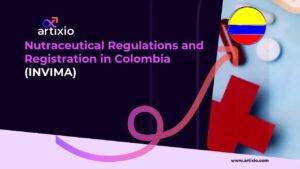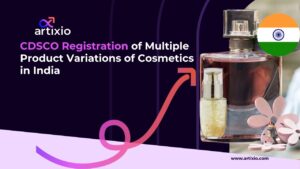Colombia Cosmetic Market
- Colombia cosmetics product market is projected to grow at a CAGR of 4.1% from 2020-2025
- Bogota is most important market for Colombia’s cosmetics industry. It accounts for almost 50% of cosmetic sales
- Colombia is the first country in South America to ban animal testing and 5th biggest skin care market in Latin America
Colombia Cosmetic Regulations & Registration
Cosmetics registration, manufacturing, import and marketing in Colombia is regulated by Andean Community Of Nations (Decision 516 of 2002),which was modified and complemented by decision 833 of 2018. A mandatory health notification is required which is an alphanumeric Code issued by INVIMA (Instituto National de Vigilancia de Medicamentos y Alimentos) is authority created in 1992 under ministry of health. All cosmetics products are sanitary registered and granted by INVIMA.
Cosmetic trade is regulated by decisions and resolutions-
- Decisions-516 and 705
- Resolutions-797, 1333, 1418, and 1482
- And in case of PHP and PAHP decision 706 and 72, resolution 1370 is applied.
Definition
Colombia Defines Cosmetic Products As-“Any Formulation Or Substances Which Is Used On Superficial Parts Of Human Body For Local Application Such As – Hairs And Capillary System, Nails, Epidermis, Lips, External Genital Region, Teeth And Oral Mucous Membranes For The Purpose Of Perfuming, Cleaning, Preventing Odor From Body, Modifying Appearance And To Keep Or Protect Then In Good Condition.
Classification as per Cosmetic Regulations in Colombia
According to annex 1of decision 516 of 2002 establishes an indicative list of product categories which are considered as cosmetics, the list includes-
- Cosmetics for children
- Cosmetics for eyes and area near eyes
- Cosmetics for grooming and hygiene
- Cosmetics for lips
- Cosmetics for skin and epidermis
- Cosmetics such as antiperspirants and deodorants
- Nail cosmetics
- Cosmetics for hairs
- Oral and dental hygiene products
- Perfumery cosmetics
- Before and after shaving products
- Skin bleaching and lightning products
- Cosmetics for sun tanning, sun protection and self-tanners
- Depilatory products
- Insect repellents that are applied to the skin
These cosmetics are to be notified to CAN authorities before placing to the market. The responsible must carry out the mandatory notification (Notificación Sanitaria Obligatoria, NSO) established within the territory in first country of sale.
Registration And Notification Process
Recently in 2019 the Decision 833 of Andean community came into force, Partially revoke Decision 516 of 2012, aims to pull of even more protection on human health and safety. The standard highlights that-
- Product should not harm human health when it is applied under normal conditions.
- Holder of the NSO will be responsible for the quality of the product.
- Free sale certificate for imported products is removed.
- Any product or formulation which treats, prevent or diagnose diseases are not considered as cosmetics
Cosmetic Products Registration Requirements In Colombia
General Requirements
- Consignment receipt without stapling
- Basic information format, application format in case of letter of application
- Legal information
- Technical information
National Cosmetics
Legal Requirements-
- Form completely filled and signed by a pharmaceutical chemist which possess professional card, based in Colombia.
- Established fee payment.
- Cosmetic group if applicable.
- Form of cosmetic such as gel, cream, liquid, emulsion etc.
- Brand and product name, if applicable.
- Contract of manufacture with manufacturer, conditioner or packer, if apply.
Technical Requirements-
- Basic formula and secondary qualitative formula as given in INCI nomenclature.
- Quantitative formula for active substances and restricted use with the parameters given in INCI nomenclature.
- Physicochemical specifications and organoleptic properties of final product.
- Microbiological properties submitted under the given conditions in Resolution 1482 of July 2.012.
- Instructions for product use.
- Label
- Studies that confirm the benefits, effects and claims of the end product.
- Primary packaging material and secondary, if applicable.
- Description of batch no. codification system.
Imported Cosmetics
Legal Requirements
Along with the documents to be given for national cosmetics additional document of certificate of free sale(FSC) notarization or a similar authorization which is issued by competent authority of the country of origin which should not be older than then 5 years from the date of presentation of NSO and authorization from the manufacturer to the responsible person for commercialization which indicates that the responsible person authorizes it only to import the product or to be the holder of sanitary notification are required for the import of cosmetics.
Health Registration Process per Cosmetic Regulations in Colombia
In article 10 of Decision 833 of 2018 establish the process for mandatory health notification.
When all the requested documents are filled, INVIMA checks all the requirements which is demanded by article 9 of Decision 833 of 2018 are met, after the successful checking an identification code is assigned for labelling purposes and for health surveillance and the product can be marketed.
Sanitary Registration Cost
The Resolution 2019058384 of December 27, 2019 updated tariff managed in INVIMA for all the proceedings which also includes mandatory health reporting in terms of UVT (Tax Value Unit) where 1 UVT=35,607 pesos according to year 2020.
CODECONCEPTUVT1027Assignment, recognition or renewal of mandatory health notification code for cosmetic products
71,15
1028Assignment, recognition or renewal of mandatory health notification code for cosmetic products (for new platforms)
65,12
Validity Of Mandatory Health Notification
The term of validity of the NSO is 7 Years, which is counted from the date of assignment when identification code was provided for the same according to the Article 18 of decision 833 of 2018.
Labelling Requirements as per Cosmetic Regulations in Colombia
Labelling is done according to Decision 516, it is mandatory that labelling should be done in Spanish only. The following information should be included on label is given below-
- Person responsible for selling or name of the manufacturer
- Country of origin
- Net quantity in terms of volume or weight
- Any precautions if required for use
- NSO number with country of emission
- Lot/batch number
- Ingredients list preceded by word “ingredients” according to INCI
- Validity of product or its expiry date
- Name and address of importer if cosmetics are imported.
Animal Testing For Cosmetics
Law 2047 of 2020 Colombia has banned animal testing for cosmetic products, their ingredients or combinations. Animal tested products that are imported, exported, manufactured or commercialized are also banned. This law will be in full force from August 2024 and in 2024 animal testing will be completely banned. The prohibition will not apply in two conditions –
- If there is no alternate model for animal testing or,
- The data to be obtained by doing animal testing has different purpose than cosmetics.
If any company or responsible person does not follow the rules will entail sanctions and fines of up to 50 k monthly minimum wages, which is imposed by INVIMA.
National government is working on strengthening capacity of national laboratories and institutions to develop new alternative methods for avoiding animal testing.
For assistance with Cosmetic Regulations in Colombia, Registration, Import and Distribution, please write to us at info@artixio.com





